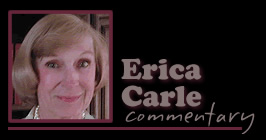Other Carle Articles:
Government
Religion In The
United States
The
Chamber Of Commerce:
It's Power And Goals
Control The Environment To Control Humanity
Universal Brotherhood And The Drive For World Unity
COLUMBUS DAY-1892!
Erica
Carle
October 28, 2007
NewsWithViews.com
This article was originally written in 1965
Millions of American public school children and their parents, unaware of the full import of what they were doing, participated in one of the greatest socialist promotions ever conceived. Socialism was being launched by its intellectual backers into a truly popular movement. Yet, had the word �socialism� been uttered on that day, those same parents would have recoiled in horror.
Many had read about socialist agitations and anarchist violence; but the philosophic ramblings of socialists interested very few busy Americans. Nevertheless, philosophers and politicians had been thinking about, talking about, and writing about various means of eliminating private ownership, equalizing wealth, counteracting individualism, and establishing world government.
The inspirational �father� of many American socialists was a French philosopher, August Comte (1798-1857). One of Comte�s important contributions to socialist thinking was the concept of Humanity, conceived as a kind of personality � the Great Being. This Great Being was to Comte and his followers the new God�embodying a new religion, the Religion of Humanity, whose purpose was to promote to the greatest possible extent the victory of social feeling over individualism. The duty of individuals was to serve the Great Being. The Great Being, in return, shows the �truest sympathy towards all its servants.�
Humanitarianism, like socialism and communism, demanded the suppression of individual personality � leaving an individual without value apart from Humanity � the Almighty Personality.
Among those who were profoundly influenced by the ideas and the religion of August Comte was the writer Edward Bellamy. Although the son of a Baptist minister, by the time he reached manhood Bellamy had abandoned the traditional individualistic religious idea which respected private ownership, and developed his own Comte-inspired system, which he called the Religion of Solidarity.
In the 1870�s, the early years of his writing career, Bellamy was employed as a literary critic. During the time he was thus employed, he read and reviewed the works of nearly all the socialist and communist writers of his time. He detected a need which had not been filled. Socialism, he believed, had to be Americanized, and made to appear more attractive if it was to appeal to people who were revolted by coercion, war, and violence.
Edward Bellamy applied his talents to fill this need, and in 1888 produced Looking Backward, a fiction depicting a generation of people supremely content in their abandonment of individual personality. It was the story of a young man, who, in a hypnotic sleep, slept away more than a century. On awakening in the year 2000, he finds that society has been completely transformed. People are no longer victims of the �insanity of individualism.� All are equal, working in a vast industrial army with equal government-provided incomes.
Children are no longer dependent on their parents for sustenance and education. They, therefore, have no reason to regard their parents as more deserving of love than any other citizens. All children are provided for by �society� or the social body. This loosening of the bonds between parents and children, according to Bellamy, eliminates a great cause of unhappiness�freeing parents to develop intellectual and aesthetic sympathies: �No man any more has any care for the morrow, either for himself or his children, for the nation guarantees the nurture, education, and comfortable maintenance of every citizen from the cradle to the grave.�
Women in Bellamy�s society are no longer plagued by the unfair �double standard,� but are encouraged to accept complete freedom in their intimate relationships. Although Bellamy does not openly advocate the mass breeding festivals and ignorance of parents as to the identity of their own children described in Plato�s Republic (Book V) he believed men should not be allowed to provide for, and therefore monopolize, their women. Bellamy condemned family ties with exclusive relationships between the sexes.
Knowing the unpopularity of the terms �socialism� and �communism,� Bellamy did not use them. Instead, he called his system �nationalism.� Today the term nationalization communicates his meaning to us, for he meant the gradual transfer of economic activity to government control or ownership; and the solidarity of all the world�s people into one social body�a brotherhood of equals, with equal government-provided incomes.
Shortly after Looking Backward was published, enthusiasts began to form themselves into clubs to promote, in fact, the �ideal life� which Bellamy had presented in his fiction. More than 150 such clubs were formed within the next few years. They went by the name Bellamy Clubs or Nationalist Clubs.
The nationalists advocated measures which Bellamy said would, by evolution, transfer control of economic facilities to government hands, working toward a gradual realization of his society of interdependence and equality. They supported and influenced the platform of the People�s Party in 1892, and had an increased political effect as time went on; advocating measures which would, by evolution, transfer control as predicted.
First would come control of railroads, telegraph, and telephone; municipal ownership of public utilities; and work for the unemployed on public improvements in times of depression. This limited government control was not to be regarded as the final goal, but merely the first and easiest steps in the transfer of all economic activity to national ownership, and later international control.
To establish the fact that individuals belonged to the nation and existed to serve the nation, nationalists advocated increased and more varied public education. They insisted education be made compulsory � thus placing the state above the parents in determining the future of their own children; for Bellamy knew �as did Karl Marx, earlier American socialists, and Plato before them � that his ideal state could not be established and maintained unless education was socially controlled and tax-supported.
Great inroads, stimulated by socialists, had already been made along this line throughout the 19th century. Hundreds of successful private educational efforts had been taken over by various governmental bodies. Many other private institutions had been regulated out of existence. Still others among the religious and private schools found it economically impossible to compete with tax-supported institutions. Almost half the states had usurped parental rights with compulsory education laws.
Despite these facts, public sentiment had not fully accepted a system which placed one man�s property in jeopardy to educate another�s children. All states had not yet claimed social rights above parental rights through compulsory education laws, and, even in tax-supported schools of the late 19th century, children were generally taught to depend on themselves and trust in God, rather than to depend on �society� and trust in government.
This teaching ran counter to Bellamy�s �Republic of The Golden Rule,� and he knew his revolution would not succeed unless moral justification could be contrived: �A great revolution, you must remember, which is to profoundly change a form of society, must accumulate a tremendous moral force, an overwhelming weight of justification, so to speak, behind it before it can start.� Part of that necessary justification was fabricated on Columbus Day, 1892.
Among those who supported and promoted nationalism and understood its implications was Edward�s cousin, the Reverend Francis Bellamy, who was himself a writer. He was enamoured of socialism and also possessed the ability to seduce his readers into agreement.
In 1892, the 400th anniversary of Columbus�s discovery of America, Francis Bellamy was a member of the editorial staff of a popular magazine called Youth�s Companion. Someone at Youth�s Companion, perhaps Bellamy, conceived the idea that Columbus Day would be the ideal occasion to promote tax-supported schools. The Companion contacted President Harrison and lobbied in Congress, and on August 18, 1892 announced:
At the close of June last an act was passed by Congress which authorized the President to issue a proclamation recommending to the people of the whole country the observance of the 21st of next October as a holiday, in commemoration of the four hundredth anniversary of the discovery of America by Columbus �
In the act of Congress which authorized the President to proclaim this anniversary as a public holiday, it was provided that he recommend that the people observe the day �by public demonstration and by suitable exercises in their schools and other places of assembly.� The mention of the schools in this act was appropriate, because the active movement for the general observance of the day has proceeded in an especial way from the projected public school celebration of the day, which The Companion is very glad to have organized and encouraged �
It is a movement which has the patriotic intention to bring to the front the American public school as the worthiest fruit of the discovery of America and the establishment of a great free republic on this continent.
There seemed, to patriotic Americans, to be nothing in the celebration to cause alarm. To them, it was as represented, a great patriotic event. Since Francis Bellamy was chairman of the executive committee which planned the event, his views on the meaning and duties of national life, and his expressed devotion to socialism, can best confirm the purpose of the celebration:
The nation is not a mass of independent individuals, but of related individuals, who, moreover, are so closely related that they make together an indivisible organism; this organism develops according to orderly laws; this organism has perpetuity, never disjoining itself either from its past or future; and the organism has also self-consciousness and moral personality. This is the nation in which we live, and move, and have our being �[Read]
Democratic government, however socialistic it may become, is nothing but democracy expressing its own will. If the individual is led to surrender certain of his freedoms for the good of all, he surrenders to a paternalism of all the people. That were better called, once and for all, a fraternalism. Socialism aims to produce an environment where not only the Golden Rule, but the Law of Love will have a living chance. [Read]
Socialists believe in the fearless extension of government because they have a clear and high idea of the nation as an organic relationship apart from which the individual cannot realize himself. As the nation becomes more self-conscious, it perceives more clearly its own responsibility for the development of each individual � [Read]
The uniform program supplied by Youth�s Companion for use by individual schools participating in the National School Celebration of Columbus Day appeared in the September 8 issue, and was signed by Francis Bellamy, committee chairman.
Individuals from one end of the country to another memorized and repeated Bellamy�s words in the program � never realizing their feelings were being subtly changed from a love of country or homeland because it was theirs and they were free, to a serf-like sentiment of belonging like obedient children to the fatherland.
�We look backward, and we look forward,� they said. �Backward we see the first mustering of modern ideas � we watch the growth of institutions out of little beginnings � schools becoming an educational system; meeting-houses leading to organic Christianity.�
Did they know what was meant by �organic Christianity�?
�We look forward. We are conscious we are in a period of transition. Ideas in education, in political economy, in social science are undergoing revisions.�
What revisions? Did they ask?
�We, therefore, on this anniversary of America present the Public School as the noblest expression of the principle of enlightenment which Columbus grasped by faith.�
�We, the youth of America, who today unite to march as one army under the sacred flag, understand our duty. We pledge ourselves that the flag shall not be stained; and that America shall mean equal opportunity and justice for every citizen, and brotherhood for the world.�
Most of the program of the National School Celebration of Columbus Day has long since been forgotten. The record of local participation can be found only by digging in the files of newspapers which existed at that time. The President�s Proclamation, the address, the �Ode for Columbus Day,� the �Song of Columbus Day� are never heard. The name Francis Bellamy is virtually unknown; but one part, with slight alteration, remains to this day. For the first time on Columbus Day, 1892, millions of American school children spoke the creed of Bellamy�s Religion of Solidarity. Millions of American school children acknowledged they were no longer individuals, but members of an indivisible social body. They spoke without thinking or analyzing:
�I pledge allegiance to my flag, and to the republic for which it stands�one nation, indivisible, with liberty and justice for all.�
The words sounded inspiring. The programs were well-planned and impressive. Without knowing it, those who participated had abandoned themselves as individuals to become part of an indivisible organism � a �union of states, and union of souls.� Liberty, to them, was not a natural or God-given right, but one granted them by the �nation indivisible.�
By this means, tax-supported schools were covered with a sacred mantle. Our beautiful symbol of liberty and independence became the sacred object of social control to lead us into socialism and a future government of the world. The flag no longer belonged to the people�the people belonged to the flag; and the children belonged to the state.
Parents after that day more willingly turned their children over to �society� to be educated, regulated, directed, dedicated. Parental rights were exchanged for an infinitesimal voice in the social control over all children. Once individual rights as parents were abandoned by granting to the state the power of decision and privilege of carrying out the training and educating of children, it was easy to rationalize justification for increased state dictatorship over material goods. Once the children came under political command, the nation was numbed to socialism. No loss of material goods can matter quite so much.
|
Subscribe to the NewsWithViews Daily News Alerts! |
It will NOT be easy to find the road back. It may take years for all of us to reclaim our God-given rights as individuals and parents�to gain supervise and direct the growth and education of our own children. Yet, every year more parents are again taking hold by placing their own children in good private or religious schools. And some of us when we see the flag, instead of pledging our lives to its fabric, think of it as it was once meant to be � a symbol of liberty, property, and independence � the glorious banner of a free America
Other references:
1,
Everett W. MacNair, Edward Bellamy and the Nationalist Movement 1889 to
1894 (Milwaukee: The Fitzgerald Co., 1957)
2, Sylvia Bowman, Edward Bellamy Abroad (New York: E. A. Twayne
Publishers, 1962.)
3, Sylvia Bowman, The Year 2000 (New York: Bookman Associates,
New York, 1958).
4, Joseph Schiffman (ed.), Edward Bellamy, Selected Writings on
Religion and Society (New York: Liberal Arts Press, 1955).
� 2007 Erica Carle - All Rights Reserved
Erica Carle is an independent researcher and writer. She has a B.S. degree from the University of Wisconsin. She has been involved in radio and television writing and production, and has also taught math and composition at the private school her children attended in Brookfield, Wisconsin. For ten years she wrote a weekly column, "Truth In Education" for WISCONSIN REPORT, and served as Education Editor for that publication.
Her books are GIVE US THE YOUNG--$5 Plus $2.00 P&H WHY THINGS ARE THE WAY THEY ARE--$16 PLUS $4.00 P&H BOTH BOOKS -- $25 Total. A loose leaf collection of quotes titled, SIX GENERATIONS TO SERFDOM is also available--$15 Plus $2.00 P&H. Mailing address: Erica Carle; PO Box 261; Elm Grove, WI 53122.
E-mail: ericacarle@sbcglobal.net
Humanitarianism, like socialism and communism, demanded the suppression of individual personality � leaving an individual without value apart from Humanity � the Almighty Personality.












